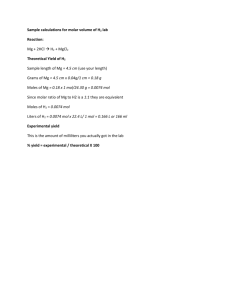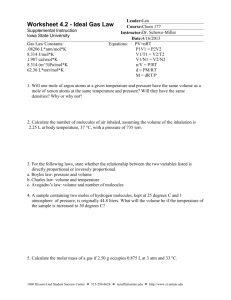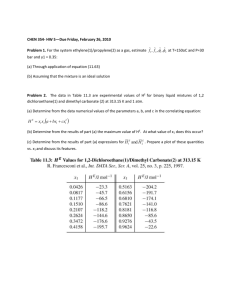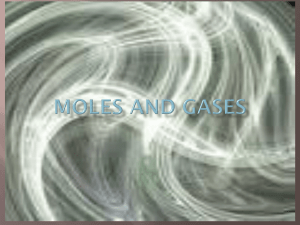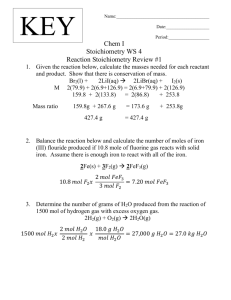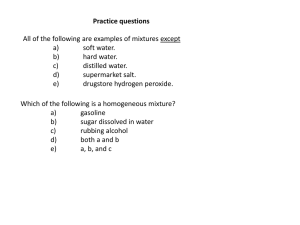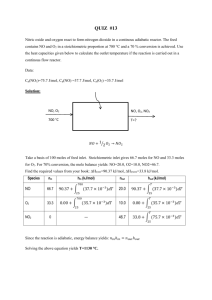Practice Exam 3 - HCC Southwest College
advertisement
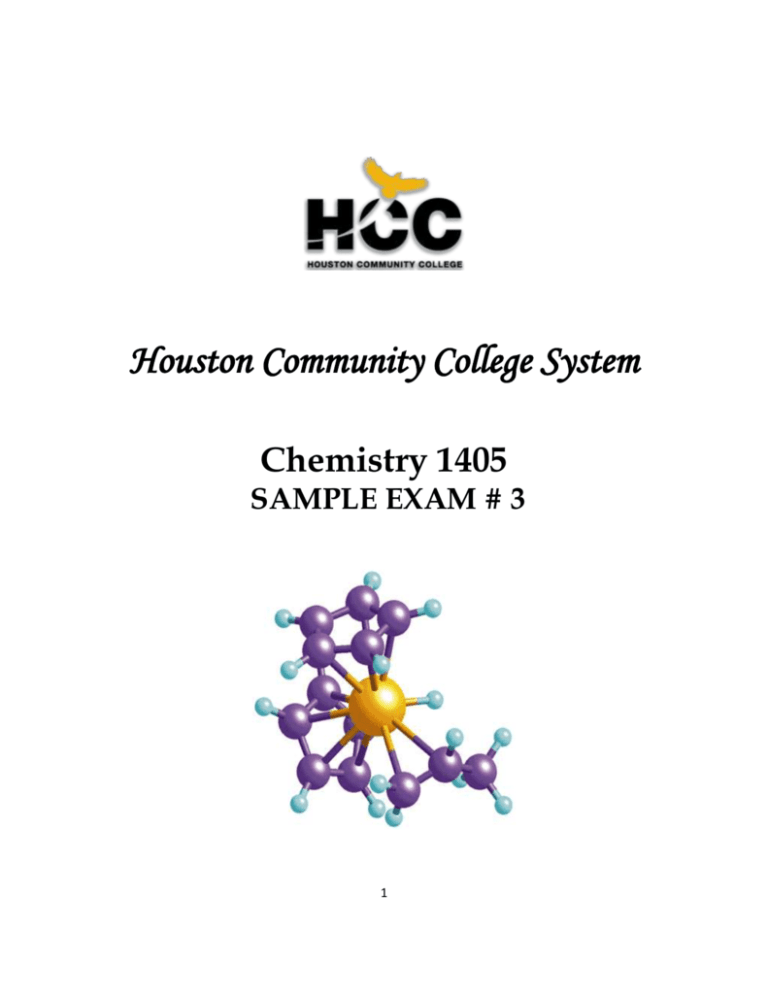
Houston Community College System Chemistry 1405 SAMPLE EXAM # 3 1 HOUSTON COMMUNITY COLLEGE CHEM 1405 Name: _____________________ Exam # 3 (Chap. 9-12) Score: PART I – Multiple choice: (3 points each) 1) What is the term for the value corresponding to the number of atoms in 12.01 g of carbon? A) Avogadro's number B) atomic number C) mass number D) mole number 2) What is the number of magnesium atoms that equal a mass of 24.31 g? A) 1 B) 12 C) 24 D) 6.02 × 10 23 3) Which of the following is equal to 1.00 mole of substance? 23 A) 6.02 × 10 sodium atoms, Na 23 B) 6.02 × 10 iodine molecules, I2 23 C) 6.02 × 10 sodium iodide formula units, NaI D) all of the above 22 4) How many moles of argon gas contain 7.52 × 10 Ar atoms? A) 0.0125 mol B) 0.0801 mol C) 0.125 mol D) 0.801 mol C) 102.16 g/mol D) 113.11 g/mol 5) What is the molar mass of caffeine, C4H5N2O? A) 43.03 g/mol B) 97.11 g/mol 6) How many moles of chlorine gas react with 1 mol of hydrogen gas according to the balanced chemical equation? H2(g) + Cl2(g) → 2 HCl(g) A) 1 mol B) 2 mol C) 3 mol D) 4 mol 7) What term expresses the ratio of moles of reactants and products according to the coefficients in the balanced chemical equation? A) mole ratio B) reactant ratio C) product ratio D) yield ratio 8) Which of the following expresses the amount of the actual yield compared to the theoretical yield? A) experimental yield B) percent yield C) ratio yield D) stoichiometric yield 9) Assuming similar conditions, how many liters of water vapor, H2O, react to produce 1L of hydrogen gas? C(s) + H2O(g) CO(g) + H2(g) A) 1 L B) 2 L C) 3 L 2 D) 4 L 10) In an experiment, 1.201 g of charcoal reacts with 6.414 g of powdered sulfur. What is the mass of product? C(s) + 2 S(s) CS2(g) A) 4.408 g B) 5.213 g C) 7.615 g D) 8.816 g 11) What is the theoretical temperature at which the kinetic energy of a gas is zero? A) absolute zero B) -100°C C) -273°F D) -273 K 12) Which of the following states that the pressure and volume are inversely proportional for a gas at constant temperature? A) Boyle's law B) Charles' law C) Dalton's law D) Gay-Lussac's law 13) If an aluminum scuba tank contains compressed air at 2750 psi, what is the pressure expressed in inches of mercury? A) 92.0 in. Hg B) 187 in. Hg C) 5590 in. Hg 4 D) 8.22 × 10 in. Hg 14) Which of the following changes decreases the pressure of a gas? A) increasing the volume C) decreasing the number of gas molecules B) decreasing the temperature D) all of the above 15) Which of the following represents the graph of volume versus temperature for a gas at constant pressure? 16) What is the term for the valence electrons in a molecule that are not shared? A) bonding electrons B) core electrons C) kernel electrons D) nonbonding electrons 17) Which of the following is held together by ionic bonds? A) AlCl3 B) Mg3N2 C) Cu2S D) all of the above 18) Which noble gas is isoelectronic with a sulfide ion? A) helium B) neon C) argon D) krypton 19) How many valence electrons are in a phosphorus atom and a phosphide ion? A) 3 and 8, respectively C) 8 and 5, respectively B) 5 and 8, respectively D) 15 and 18, respectively 3 20) What is the total number of valence electrons in one molecule of H2O2? A) 2 B) 8 C) 14 D) 18 PART II – Show All Your Work: (8 points each) 1) What is the density of ozone gas, O3, at STP? 2) What is the mass of potassium iodide (166.00 g/mol) that yields 0.500 g of lead (II) iodide (461.0 g/mol) precipitate? __Pb(NO3)2(aq) + __KI(s) → __PbI2(s) + __KNO3(aq) 3) What is the volume of oxygen gas at STP from the decomposition of 10.8 g of mercuric oxide (216.59 g/mol)? __HgO(s) → __Hg(l) + __O2(g) 3 4) If 50.0 cm of xenon gas is at 0.460 atm and -123°C, what is the volume at STP? 5) Hydrogen has an electronegativity value of 2.1. Given the electronegativity of N, O, and P (3.0, 3.5, and 2.1, respectively), predict which of the following has nonpolar bonds. NH3, H2O, PH3 BONUS QUESTION – Show All Your Work: (10 points) Draw the Lewis structure for the following molecules and indicate the number of bonding electrons, nonbonding electrons and the shape of each one. SiO2, CH4 4 5 Answer Key Part I- Multiple Choice 1) A 8) B 15) D 2) D 9) A 16) D 3) D 10) C 17) D 4) C 11) A 18) C 5) B 12) A 19) B Part II- Show Your Work 1) 2.14 g/L 2) 0.360 g 3) 0.558 L 4) 41.9 cm 3 5) PH3 6 6) A 13) C 20) C 7) A 14) D
